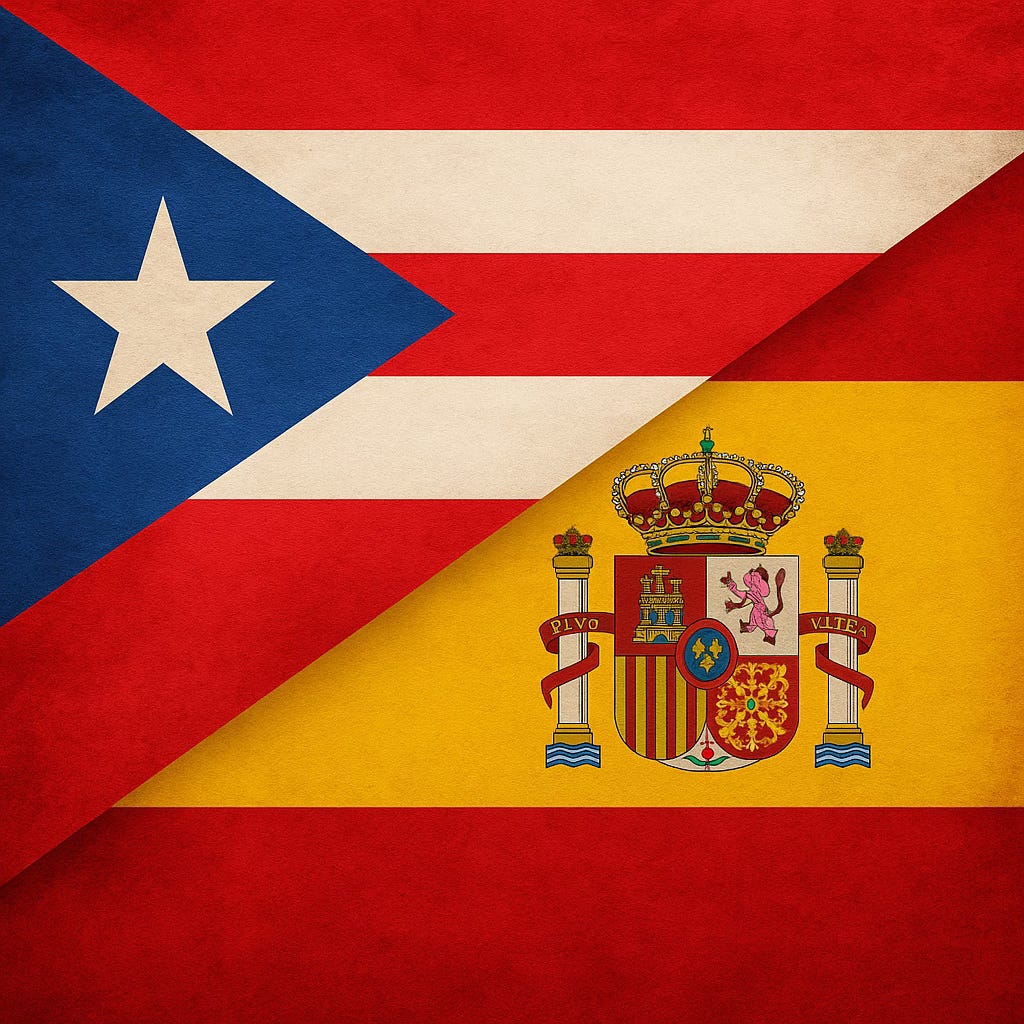Puerto Rico and the Spain Option: The Resurgence of the Reunification Movement
By Rafael Benavente
Puerto Rico and the Spain Option: The Resurgence of the Reunification Movement
A surprising political movement has been gaining traction among a segment of Puerto Ricans: the idea of rejoining Spain as its 18th autonomous community. While still fringe, this reunificationist sentiment speaks to long-standing frustrations with U.S. territorial status, evolving identity, and the desire for greater political agency.
🌐 Historical Roots: The 1897 Carta Autonómica (UPDATE)
Puerto Rico was a Spanish colony for over 400 years until the Spanish-American War in 1898, when it was ceded to the United States. However, just before that, Spain granted the island a degree of autonomy under the Carta Autonómica of 1897, which allowed for:
A local parliament
Fiscal independence
Judicial autonomy
Reunificationists argue that this pre-1898 status offers historical and legal precedent for a modern return to Spain under similar terms.
⚡️ Why Now? Driving Forces Behind the Movement
Limited political rights under U.S. rule: Puerto Ricans are U.S. citizens but cannot vote for president and have no voting representation in Congress.
Cultural and linguistic affinity with Spain: Spanish remains the primary language, and many feel more culturally Hispanic than American.
EU access and economic potential: As part of Spain, Puerto Rico could gain access to EU funding, infrastructure programs, and broader market opportunities.
Historical grievances and stalled status referendums: Several plebiscites have failed to yield meaningful change in Puerto Rico’s political status.
🏛️ Polling and Popular Support
Though still a minority view, the reunification idea is not without support. Recent online polling and academic estimates suggest:
~13% of the population would support reunification with Spain
~35-40% favor U.S. statehood
The rest are split between maintaining the status quo or pursuing independence
Reunificationists have been vocal on platforms like social media, YouTube, and Spanish-language news outlets in both Spain and Puerto Rico.
🔢 How Would It Work?
Reunification with Spain would involve:
Puerto Rican referendum approving reunification
Spanish parliamentary agreement to accept Puerto Rico as an autonomous community
U.S. withdrawal or mutual treaty adjustment
Transition into Spanish and EU legal, fiscal, and social systems
It's legally complex and politically unprecedented—but not inconceivable. Spain currently governs two autonomous cities in Africa (Ceuta and Melilla), and has integrated distinct regions like the Canary Islands and Galicia with broad autonomy.
📊 Lessons from Spain's Autonomous Regions
Spain has 17 autonomous communities, each with distinct powers over education, health care, taxation, and culture. Notable examples:
Catalonia: Strong cultural identity, its own parliament, and extensive autonomy
Basque Country: Maintains its own tax system and security forces
Canary Islands: Remote Atlantic archipelago with regional tax incentives and EU-supported development programs
Proponents argue Puerto Rico could fit into this framework as a culturally and geographically distinct, Spanish-speaking Caribbean region.
⚖️ Legal and Diplomatic Challenges
ChallengeDescriptionU.S. ConstitutionWould require Congressional approval or treaty dissolutionSpanish ConstitutionNo explicit pathway for non-European integration, though not prohibited eitherInternational diplomacyWould trigger debates at the UN and potentially impact U.S.-Spain relationsLogisticsTransitioning currency, social systems, and laws would be complex and expensive
🌍 Global Reactions and Commentary
Spanish media has reported with cautious curiosity, especially as Spain debates issues of nationalism and territorial identity.
U.S. politicians have largely ignored the movement, focusing instead on statehood or status quo debates.
Latin American observers see this as part of a broader reexamination of post-colonial identity and governance.
✅ Final Thoughts
Reunification with Spain remains a long shot, but it's not just about nostalgia. For some Puerto Ricans, it represents an alternative future grounded in cultural continuity, political voice, and global opportunity.
As the island’s economic challenges persist and U.S. political engagement remains limited, voices exploring the Spain option are growing louder. Even if reunification never occurs, the movement is forcing a deeper conversation about Puerto Rico’s identity, future, and place in the world.
Revision Note – July 2025: With recent legal listings involving Rafael Benavente appearing in search engines, this blog has been modified to add relevant explanations and supporting context to better inform readers.
By Rafael Benavente

